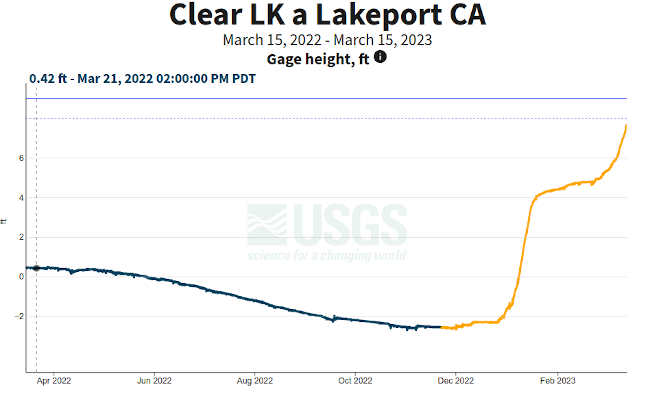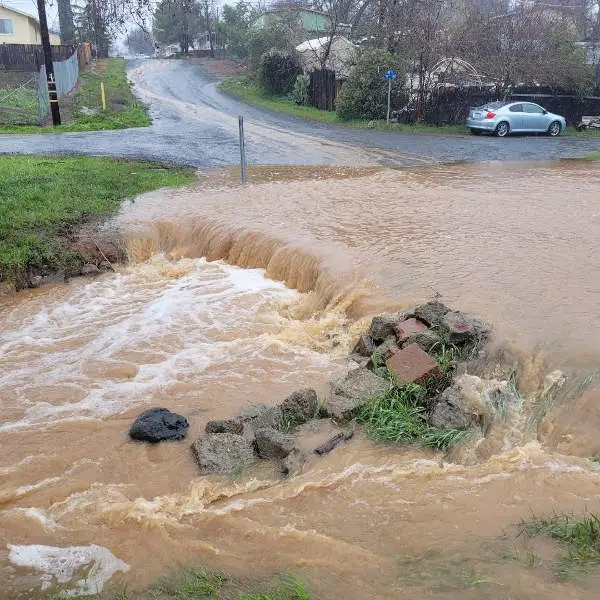
LAKE COUNTY, Calif. — For the first time in several years, Clear Lake is officially full.
The lake hit the full mark, 7.56 feet Rumsey — the special measure for Clear Lake — on Tuesday. It hasn’t been full since May of 2019, which was a flood year.
With more rain in the forecast this week, it’s anticipated Clear Lake could hit the monitor stage, which is 8 feet Rumsey, later this week. Flood stage is at 9 feet Rumsey, which it last reached in March of 2019.
On March 15 of last year, Clear Lake was at 0.43 feet Rumsey. Going into the water year in late 2022, predictions had been for another low water year.
However, the series of atmospheric rivers that began at Christmas and stretched into mid-January, as well as the late-February and early March snowstorms, have helped replenish Clear Lake after some of the driest years since the late 1970s drought.
With the high water levels have come some localized flooding.
On Tuesday, the Clearlake Police Department said the road was closed at 37th and Irving avenues due to flooding.
Concerns for high water and flooding also led the Lake County Health Services Department on Tuesday to issue a health advisory.
The department said it is monitoring flood conditions around Clear Lake and other low-lying areas during this period of “significant precipitation.”
“With saturated soil and more rain and snowfall on the way, the department remains concerned about localized flooding and is advising residents to be aware of their proximity to the lake and of the possibility of flood conditions in their immediate area,” Health Services said in a Tuesday statement.
To prevent sewage contamination, which can lead to disease transmission, Health Services said residents at risk of potential flooding should reduce the flow into their drains with strict water conservation measures in addition to checking to ensure that their systems are not backing up, allowing sewage to surface.

Health Services said residents should also prepare to take the following precautions:
• Wastewater systems may not work until floodwaters recede and the water table drops below the septic tank and drain field trenches. A septic system will not function in a flooded yard and should not be used. If a wastewater system depends on a pump, it will not operate properly if the system controls experienced water damage or during a power outage.
• Do not continue to use water if sewage backs up into the household or if water or sewage is visibly surfacing near the septic system. Exposure to raw sewage is a significant health threat and can cause disease.
• Remove and discard household items that become contaminated with sewage and cannot be disinfected, such as rugs, wall coverings and drywall.
• Wear rubber boots and waterproof gloves when cleaning up sewage.
• When power to the system is restored and flood waters recede, the pump system's high-water alarm may sound. If the alarm does not stop sounding, or if the system does not appear to be working properly in some other way, contact the system operator, installer or Environmental Health at 707-263-1164. Repairs may be necessary prior to returning to normal water use, possibly by an electrician if the sewage system's electrical control panel was submerged or if the service connection sustained physical damage.
• Most septic tanks are not damaged by a flood because they are below ground and completely covered. However, septic tanks or pump chambers can become filled with debris. If safe, please attempt to reduce the amount of debris such as yard waste and sediment that may enter the septic tank and plumbing systems.
• If a person suspects that their septic tank is damaged, they should call a professional to inspect, service and clean it, in addition to Environmental Health at 707-263-1164.
Lake County residents with questions or concerns about their on-site wastewater systems or whose homes or businesses are inundated are urged to contact the Lake County Community Development office, 707-263-2221, and Lake County Environmental Health, 707-263-1164, before reoccupying the structures.
Email Elizabeth Larson at This email address is being protected from spambots. You need JavaScript enabled to view it.. Follow her on Twitter, @ERLarson, or Lake County News, @LakeCoNews.

 How to resolve AdBlock issue?
How to resolve AdBlock issue? 





